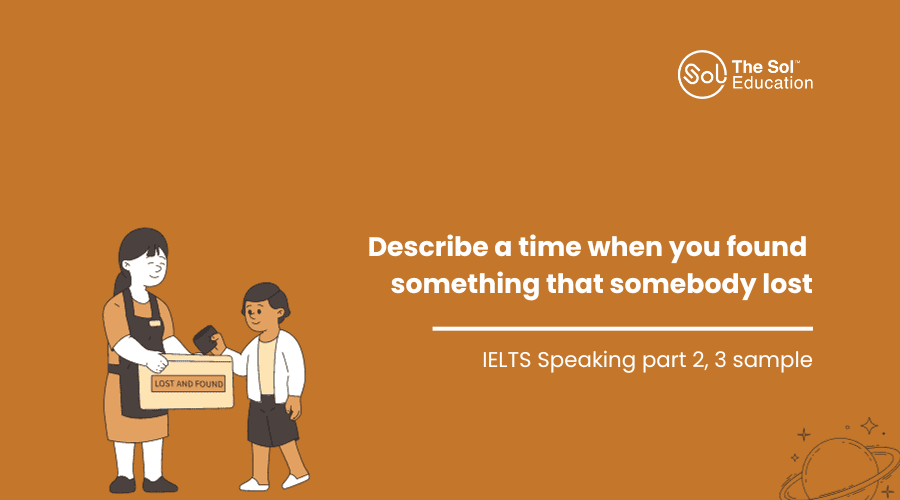Describe a time when you found something that somebody lost là một chủ đề khá thú vị. Chúng ta hãy cùng nhau chữa đề bài này cùng SOL nhé.
Tham khảo:
Describe a time when you found something that somebody lost.
You should say:

Lost and found incidents often unfold in the most unexpected moments of our lives. One such episode occurred when I stumbled upon a misplaced wallet during my evening stroll in the local park. The wallet, lying inconspicuously on a bench, revealed not just its material contents but the potential to make someone's day better.
The finding took place on a serene Saturday evening. As the sun dipped below the horizon, casting warm hues across the park, I noticed the wallet left unattended. Curiosity led me to inspect its contents, revealing identification cards, credit cards, and a modest sum of cash. Recognizing the potential stress and inconvenience the loss might cause, I decided to play the role of an unwitting good Samaritan.
Driven by a sense of responsibility, I took the wallet to the park's information center, leaving it with the staff. I hoped that the wallet's owner would retrace their steps to find it or, better yet, receive a call from the information center.
The feeling that accompanied this discovery was one of moral satisfaction. While I did not witness the wallet's owner reclaiming their possession, the act of doing the right thing imparted a sense of goodwill. It underscored the significance of small gestures in fostering a sense of community and reminded me of the collective responsibility we all share in making our surroundings more secure and being more compassionate to our fellow man.
People often lose small items like keys, wallets, and phones, which are essentials for daily life. Additionally, personal belongings such as jewelry, glasses, or even important documents are commonly misplaced. It's easy to overlook these items due to their size and frequency of use.
Some people may have a keen sense of observation or an organized mindset that helps them notice details and remember where items were last seen. Additionally, familiarity with the surroundings and the ability to retrace steps can contribute to finding lost items quickly.
Absolutely. Teaching children to return things is essential for instilling a sense of responsibility and consideration for others. It helps them understand the value of belongings and fosters good manners. This habit lays the foundation for responsible behavior in various aspects of life.
Collecting things from the past often stems from a sense of nostalgia and a desire to preserve history or personal memories. It provides a connection to bygone eras, cultural heritage, or significant life events. Collectors find joy and fulfillment in assembling and curating items that hold sentimental or historical value.
People can collect things from the past through various avenues such as antique shops, flea markets, online auction platforms, or even family heirlooms. Museums and historical sites are also sources of valuable artifacts. The choice depends on personal interests and the specific era or theme of the collection.
Yes, I believe collecting can be a positive habit. It provides a sense of purpose, passion, and a connection to one's interests. Additionally, it can be an educational and enriching experience, fostering knowledge about different cultures, historical periods, or artistic styles. However, moderation and mindful curation are crucial to avoid excessive accumulation.
Từ vựng IELTS hữu ích:
Bên cạnh yếu tố từ vựng, nội dung thì việc đảm bảo các tiêu chí về phát âm, độ trôi chảy rất quan trọng trong phần thi IELTS Speaking. Hãy luyện tập thật nhiều để có thể thể hiện một cách tốt nhất, giúp bạn đạt aim IELTS nhé.
